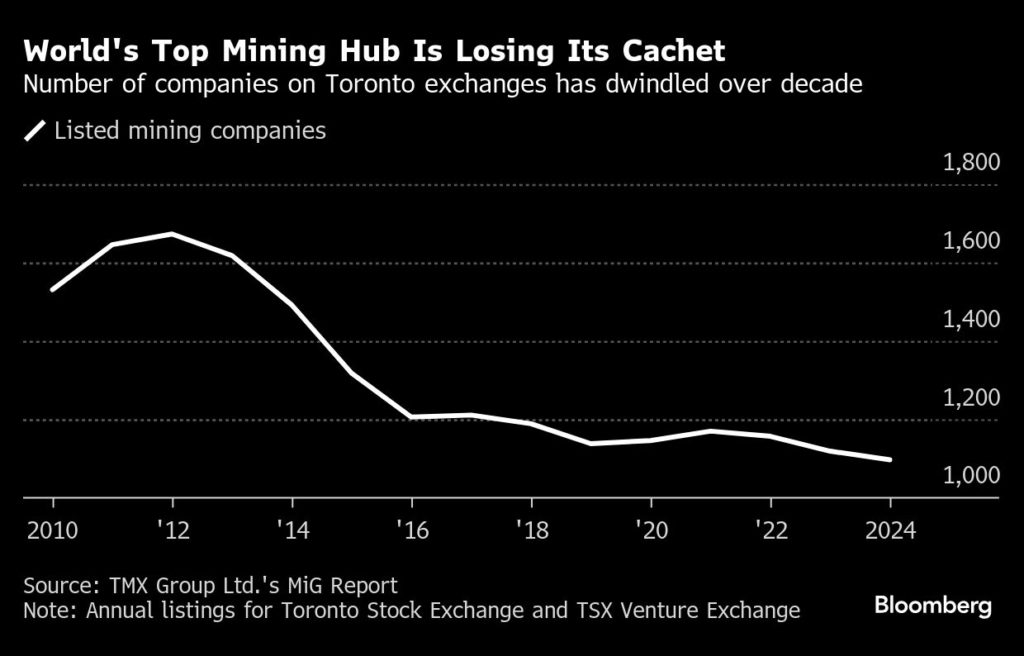Prospectors & Developers of Canada Association Conference
Colin McClelland - The Northern Miner |
March 5, 2025 |

Jonathan Wilkinson, Canada’s Minister of Energy & Natural Resources. Credit: Colin McClelland
Canada’s energy and natural resources minister said the Trump administration must realize it could soon face taxed critical mineral exports from its northern neighbour in response to tariffs that began on Tuesday.

The US depends on Canadian oil, nickel, zinc, uranium, potash and germanium – among other resources – to make steel, ships and planes, fuel power plants and grow food, Jonathan Wilkinson said at the Prospectors & Developers of Canada Association’s annual convention in Toronto.
“When President Trump says he doesn’t need something from Canada, that’s just not true,” Wilkinson told reporters Tuesday afternoon. “And so looking at putting on either our own export tariffs or looking at other measures that would include deciding we’re going to sell some of those products elsewhere, those are fully on the table.”
After the US imposed 25% tariffs on most Canadian goods, and 10% on oil and minerals, Canada fired back with its own levies.
Separate 25% duties on aluminum and steel are due March 12. The minister’s planned trip to meet this week in Washington with Doug Burgum, US Secretary of the Interior, was postponed, Wilkinson’s staff said Wednesday.
The situation is fluid, with President Donald Trump and Prime Minister Justin Trudeau due to speak by phone Wednesday morning. Trump is to make an announcement Wednesday afternoon that might exempt the auto sector or contain reduced tariffs, US Secretary of Commerce Howard Lutnick told Bloomberg News.
The stunning move by the Trump administration to levy tariffs on its oldest ally and biggest trading partner when the continent has had a free trade agreement for more than 30 years has left Canadians bewildered but determined to fight back. While mining executives generally welcome a US President who’s keen to slash red tape and approve projects, the mood at PDAC was one of defiance against an irrational trade war.
Tariff irony
“With critical minerals, the option that the Americans have is to buy more from China, or it’s to buy more of some of them – the potash trade, in particular – from Russia,” Wilkinson said. “It’s hard to see how the measures that are being taken by the American president to a country that has historically been their closest friend and ally leads them down a path to purchasing more materials from their greatest adversaries.”
Ontario Premier Doug Ford said Tuesday he would consider export taxes on nickel and electricity that could be around 25%. A day earlier, he suggested nickel could be stockpiled and sold in other markets. However, Minister Wilkinson and Vic Fedeli, Ontario’s Minister of Economic Development, Job Creation and Trade, couldn’t say exactly how these plans would work other than through federal-provincial cooperation. While provinces control extraction, Ottawa determines export policies.
Wilkinson noted that Atlantic region giant Irving Oil raised prices for its US-bound fuels like gasoline and heating oil by 10% on Tuesday. Canadians have already begun making choices to replace American products like Kentucky bourbon and Florida orange juice, while US Republican Senators Rand Paul, Mitch McConnell and Paul Thune expressed opposition to the tariffs.
“First and foremost, Americans are going to feel it at the pump and in their utility bills simply because of the tariffs that the President himself has imposed on American consumers,” Wilkinson said. “The first point of departure is to create domestic pressure, to get the administration to reflect on its decision.”
Toronto exchange’s (TSX) mining dominance under threat as explorers exit
Bloomberg News | March 3, 2025 |

Toronto Stock Exchange entrance. ( Stock Image.)
Toronto’s claim as the world’s top mining hub is under threat as exploration companies leave Canada and listings dwindle on the nation’s resource-heavy stock exchange.

Canada’s once-thriving mining industry is facing challenges to its decades-old model, in which explorers and developers woo investors with promises of mining breakthroughs and established producers feed on their success, swallowing them in lucrative takeovers. Industry consolidation has reduced head offices and eliminated listings, companies find it harder to attract investors, and government rules on foreign investment have become more restrictive.
“The industry that has fueled most of the great Canadian minerals discoveries over the past 50 years is but a skeleton of itself,” said mining financier Pierre Lassonde, who co-founded Franco-Nevada Corp. “We should be extremely concerned.”
Three small firms shut their Canadian headquarters in the past nine months to relocate to other countries: Lithium Argentina AG, Solaris Resources Inc. and Falcon Energy Materials Plc. At least two others — Cornish Metals Inc. and Almonty Industries Inc. — are embarking on similar plans. It’s not just small companies: Toronto-based Barrick Gold Corp., the world’s No. 2 miner, has mused about redomiciling to the US.
As executives, bankers and investors gather this week for the annual Prospectors and Developers Association of Canada conference in Toronto, the health of the industry is top of mind for attendees visiting this global mining epicenter.
The Toronto Stock Exchange and the TSX Venture Exchange represent 40% of the world’s public mining companies, providing home to 1,097 listings, exchange owner TMX Group Ltd. said in its latest listings guide. That’s down from 2010, when the exchanges had 1,531 mining companies to account for 56% of global listings for the industry. The decline comes as stock markets in London, Sydney and New York have been competing to attract mining companies.

Allied Gold Corp. is applying for a listing on the New York Stock Exchange, joining an industrywide migration to the world’s top bourse. The Toronto-based company would join a long list of gold miners that are on both Canadian and US exchanges.
New York’s status as a global hub for gold equities expanded in recent years after a series of major deals transformed the industry and created two North American titans — Newmont Corp. and Barrick — that trade in the US city. Barrick has long been headquartered in Toronto, though last month the Globe and Mail reported that CEO Mark Bristow said he was considering redomiciling to the US. Barrick didn’t respond to requests for comment.
Barrick weighs US relocation, says CEO Bristow
Toronto’s dwindling mining listings over the past decade can be partly chalked up to consolidation and shifting focus, according to TMX Group. About half of mining delistings were tied to mergers and acquisitions, and 27% were companies that converted to cannabis firms.
A dearth of initial public offerings in recent years hasn’t helped stem the decline. There were no significant mining IPOs in the past year. Back in 2010, 90 miners went public after collectively raising $1.26 billion.
The roots of the financing drought can be traced back to the commodities boom of the early 2010s, when miners borrowed heavily to fund ambitious exploration targets and mammoth takeovers. When markets crashed, it left balance sheets shredded and shareholders with dramatic losses.
“The junior miners have been in a nuclear winter ever since,” said David Garofalo, chief executive officer of Gold Royalty Corp. “The sector overspent on exploration, it overspent on expansions, and so there was a major hangover — massive amounts of debts on balance sheets, and significant cost escalation.”
Meanwhile, the growth of investor interest in exchange-traded funds has supplanted smaller, resource-focused funds that take positions in junior miners.
“We’ve seen a market evolution over the last 10 years — a rotation away from those smaller resource funds into larger funds that are more passive,” said Jeff Killeen, director of policy and programs at the Prospectors & Developers Association of Canada. “And that inherently brings up the threshold for minimum investment.”
That’s left smaller companies chasing financial support from other sources, including Chinese investors willing to make bets on their prospects. The reliance some small firms have on Chinese funding is a testament to a lack of alternatives, said Lassonde, who’s leading a campaign calling for Canadian pension fund managers to boost investment in domestic companies.
“As juniors, you get the money wherever you can,” he said. “And if Canada can’t be there for them, they leave.”
For those staying in Canada, it’s getting harder to find financial backers. Prime Minister Justin Trudeau’s government has been cracking down on foreign investment in mining since late 2022, after his government ordered three Chinese firms to divest from a trio of Canadian lithium explorers. The move came amid a broader push by Western countries to tackle China’s growing dominance in the critical minerals supply chain. The federal government further tightened mining investment rules last July, prompting some departures.
“I don’t think it’s going to start a stampede for the door, but it shows how these policies have been viewed as relatively aggressive and broad in scope,” said Braden Jebson, a mergers and acquisitions lawyer at Torys LLP, in an interview. “Companies with limited Canadian connections are assessing if those are worth the limitations of these investment policies.”
Among the exits, Solaris Resources moved to Ecuador after the copper company called off a financing deal with Zijin Mining Group that would have given the Chinese firm a 15% stake and a board seat.
Falcon Energy moved to Abu Dhabi after failing to secure a $12.7 million investment from China’s Carbon ONE New Energy Group Ltd. The move gave the company previously known as SRG Mining Inc. “expanded strategic options” while seeking to build a graphite mine in New Guinea, it said at the time.
And Lithium Argentina, which has partnered with China’s Ganfeng Lithium Group Co., relocated its Vancouver headquarters to Switzerland in January, calling it the “best jurisdiction from a strategic, commercial and legal perspective” and noting the move provided expanded financing flexibility.
“If the government keeps making it harder for companies to access global capital, it could impact Canada’s overall health in the medium to long term,” said Dean McPherson, TMX Group’s global mining head. “It means a loss of potential revenue and a loss of strength for Canada as a global destination for mining companies to be domiciled.”
(By Jacob Lorinc)
Bloomberg News | March 3, 2025 |

Toronto Stock Exchange entrance. ( Stock Image.)
Toronto’s claim as the world’s top mining hub is under threat as exploration companies leave Canada and listings dwindle on the nation’s resource-heavy stock exchange.

Canada’s once-thriving mining industry is facing challenges to its decades-old model, in which explorers and developers woo investors with promises of mining breakthroughs and established producers feed on their success, swallowing them in lucrative takeovers. Industry consolidation has reduced head offices and eliminated listings, companies find it harder to attract investors, and government rules on foreign investment have become more restrictive.
“The industry that has fueled most of the great Canadian minerals discoveries over the past 50 years is but a skeleton of itself,” said mining financier Pierre Lassonde, who co-founded Franco-Nevada Corp. “We should be extremely concerned.”
Three small firms shut their Canadian headquarters in the past nine months to relocate to other countries: Lithium Argentina AG, Solaris Resources Inc. and Falcon Energy Materials Plc. At least two others — Cornish Metals Inc. and Almonty Industries Inc. — are embarking on similar plans. It’s not just small companies: Toronto-based Barrick Gold Corp., the world’s No. 2 miner, has mused about redomiciling to the US.
As executives, bankers and investors gather this week for the annual Prospectors and Developers Association of Canada conference in Toronto, the health of the industry is top of mind for attendees visiting this global mining epicenter.
The Toronto Stock Exchange and the TSX Venture Exchange represent 40% of the world’s public mining companies, providing home to 1,097 listings, exchange owner TMX Group Ltd. said in its latest listings guide. That’s down from 2010, when the exchanges had 1,531 mining companies to account for 56% of global listings for the industry. The decline comes as stock markets in London, Sydney and New York have been competing to attract mining companies.

Allied Gold Corp. is applying for a listing on the New York Stock Exchange, joining an industrywide migration to the world’s top bourse. The Toronto-based company would join a long list of gold miners that are on both Canadian and US exchanges.
New York’s status as a global hub for gold equities expanded in recent years after a series of major deals transformed the industry and created two North American titans — Newmont Corp. and Barrick — that trade in the US city. Barrick has long been headquartered in Toronto, though last month the Globe and Mail reported that CEO Mark Bristow said he was considering redomiciling to the US. Barrick didn’t respond to requests for comment.
Barrick weighs US relocation, says CEO Bristow
Toronto’s dwindling mining listings over the past decade can be partly chalked up to consolidation and shifting focus, according to TMX Group. About half of mining delistings were tied to mergers and acquisitions, and 27% were companies that converted to cannabis firms.
A dearth of initial public offerings in recent years hasn’t helped stem the decline. There were no significant mining IPOs in the past year. Back in 2010, 90 miners went public after collectively raising $1.26 billion.
The roots of the financing drought can be traced back to the commodities boom of the early 2010s, when miners borrowed heavily to fund ambitious exploration targets and mammoth takeovers. When markets crashed, it left balance sheets shredded and shareholders with dramatic losses.
“The junior miners have been in a nuclear winter ever since,” said David Garofalo, chief executive officer of Gold Royalty Corp. “The sector overspent on exploration, it overspent on expansions, and so there was a major hangover — massive amounts of debts on balance sheets, and significant cost escalation.”
Meanwhile, the growth of investor interest in exchange-traded funds has supplanted smaller, resource-focused funds that take positions in junior miners.
“We’ve seen a market evolution over the last 10 years — a rotation away from those smaller resource funds into larger funds that are more passive,” said Jeff Killeen, director of policy and programs at the Prospectors & Developers Association of Canada. “And that inherently brings up the threshold for minimum investment.”
That’s left smaller companies chasing financial support from other sources, including Chinese investors willing to make bets on their prospects. The reliance some small firms have on Chinese funding is a testament to a lack of alternatives, said Lassonde, who’s leading a campaign calling for Canadian pension fund managers to boost investment in domestic companies.
“As juniors, you get the money wherever you can,” he said. “And if Canada can’t be there for them, they leave.”
For those staying in Canada, it’s getting harder to find financial backers. Prime Minister Justin Trudeau’s government has been cracking down on foreign investment in mining since late 2022, after his government ordered three Chinese firms to divest from a trio of Canadian lithium explorers. The move came amid a broader push by Western countries to tackle China’s growing dominance in the critical minerals supply chain. The federal government further tightened mining investment rules last July, prompting some departures.
“I don’t think it’s going to start a stampede for the door, but it shows how these policies have been viewed as relatively aggressive and broad in scope,” said Braden Jebson, a mergers and acquisitions lawyer at Torys LLP, in an interview. “Companies with limited Canadian connections are assessing if those are worth the limitations of these investment policies.”
Among the exits, Solaris Resources moved to Ecuador after the copper company called off a financing deal with Zijin Mining Group that would have given the Chinese firm a 15% stake and a board seat.
Falcon Energy moved to Abu Dhabi after failing to secure a $12.7 million investment from China’s Carbon ONE New Energy Group Ltd. The move gave the company previously known as SRG Mining Inc. “expanded strategic options” while seeking to build a graphite mine in New Guinea, it said at the time.
And Lithium Argentina, which has partnered with China’s Ganfeng Lithium Group Co., relocated its Vancouver headquarters to Switzerland in January, calling it the “best jurisdiction from a strategic, commercial and legal perspective” and noting the move provided expanded financing flexibility.
“If the government keeps making it harder for companies to access global capital, it could impact Canada’s overall health in the medium to long term,” said Dean McPherson, TMX Group’s global mining head. “It means a loss of potential revenue and a loss of strength for Canada as a global destination for mining companies to be domiciled.”
(By Jacob Lorinc)
No comments:
Post a Comment